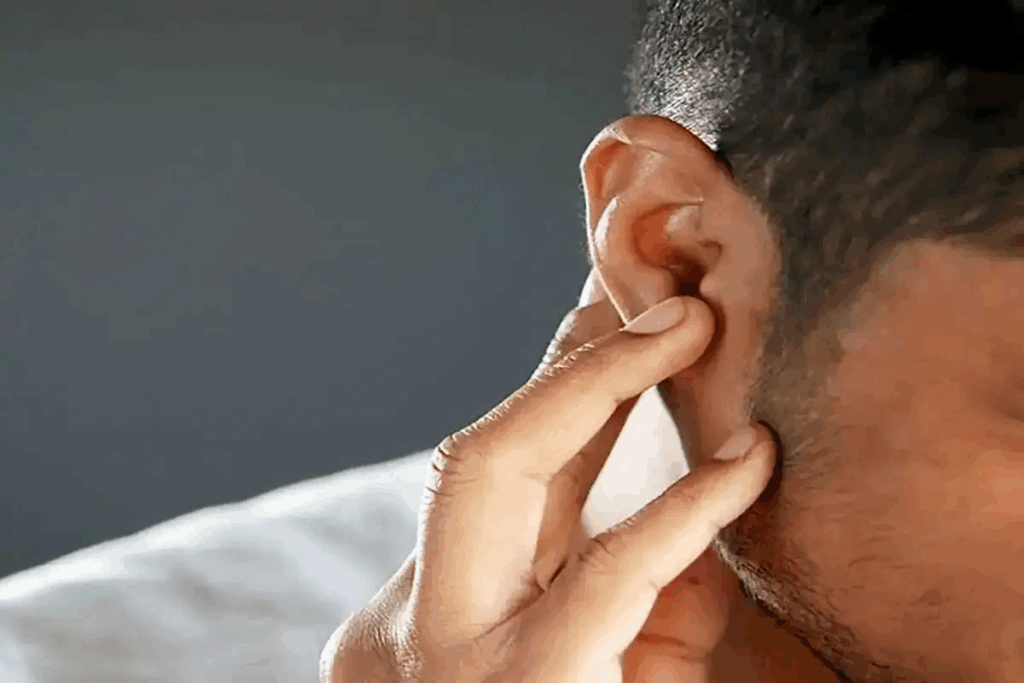
When an ear infection hits, it’s not just the ear that gets hurt. The swelling and fluid can make you feel dizzy, off balance, and give you headaches. These symptoms can really mess up your day.
At Liv Hospital, we know that problems like labyrinthitis and vestibular neuritis can make you dizzy and off balance. Middle ear infections can also cause both earache and headache at the same time.
We’ll look into how ear infections can make you dizzy and give you headaches. We’ll talk about the ear’s anatomy and how infections affect balance and pain.
Why does ear infection dizzy spells occur? Learn how inflammation disrupts the balance sensors in the inner ear, leading to vertigo and headaches.

Knowing how the ear works is key to understanding dizziness and headaches from infections. The human ear is complex and vital for hearing and balance. It’s important to know the ear’s parts and how they affect balance.
The ear has three main parts: the outer ear, middle ear, and inner ear. The outer ear catches sound waves and sends them into the ear canal. The middle ear has the eardrum and three tiny bones that carry sound to the inner ear. The inner ear has the cochlea for hearing and the vestibular system for balance.
The inner ear’s vestibular system is key for balance. It has three semicircular canals and the otolith organs (utricle and saccule). These parts have sensory hair cells that detect movement and head position changes, sending signals to the brain.
When you move your head, the fluid in the semicircular canals lags, bending the sensory hair cells. This bending tells the brain about the movement’s direction and speed. The otolith organs help with linear acceleration and gravity changes, aiding balance.
The ear and brain work together for balance and spatial awareness. The vestibular system sends signals to the brain, which uses this info along with eye and muscle signals. This helps us stay balanced and move well.
When an ear infection happens, it can mess with this system. This can cause dizziness and make it hard to balance.

Ear infections can show up in many ways, affecting different parts of the ear. This leads to various symptoms. Knowing these types helps us diagnose and treat them well.
Labyrinthitis is when the inner ear, called the labyrinth, gets inflamed. This area is key for hearing and balance. Symptoms include vertigo, dizziness, nausea, and imbalance.
This condition can come from viral infections, like the flu. It affects both balance and hearing because it impacts the whole labyrinth.
We know labyrinthitis is serious and needs quick medical help. Its symptoms can really hurt a person’s life quality. Treatment aims to ease symptoms and find the cause of the inflammation.
Vestibular neuritis mainly hits the vestibular nerve, causing severe dizziness and balance issues. It’s usually from a viral infection and makes the nerve inflamed. Unlike labyrinthitis, it mostly messes with balance, not hearing.
Symptoms can be very strong, with sudden vertigo being a big sign. People might find it hard to walk, feel nauseous, and vomit. We focus on easing these symptoms for the patient’s comfort and recovery.
Both labyrinthitis and vestibular neuritis can really mess with daily life, causing dizziness and balance problems. It’s key to tell them apart for the right treatment.
Condition | Primary Symptoms | Impact on Hearing | Impact on Balance |
Labyrinthitis | Vertigo, dizziness, nausea, hearing loss | Affects hearing | Affects balance |
Vestibular Neuritis | Severe dizziness, vertigo, balance problems | No impact on hearing | Affects balance |
Understanding the differences helps us diagnose and treat dizziness and balance issues from ear infections better.
Ear infections can really mess with our balance, causing dizziness and vertigo. The ear and our balance system are closely linked. So, any ear infection can deeply affect how we stay balanced.
Our balance comes from a complex system in the ear, the vestibular nerve, and the brain. An ear infection can cause fluid buildup and pressure changes. This can spread to the head, causing headaches.
The vestibular system is key for balance and knowing where we are in space. It includes the otolith organs and semicircular canals in the inner ear. These are filled with fluid and have sensory hair cells.
These hair cells detect movement and changes in our head position. They send important signals to the brain. When an ear infection hits the vestibular system, it can cause inflammation and mess with these hair cells.
Key aspects of the vestibular system include:
Ear infections often lead to fluid buildup in the middle or inner ear. This fluid can cause pressure changes that affect the vestibular system. The increased pressure can irritate the vestibular nerve, causing dizziness and balance issues.
The Eustachian tube, which helps regulate ear pressure, can get blocked during an infection. This blockage can lead to more pressure changes, making dizziness and vertigo worse.
The equilibrium sensors in the inner ear are very sensitive to pressure and movement changes. When an ear infection causes fluid buildup or inflammation, these sensors can get impaired. This makes the signals to the brain about our position and movement distorted, leading to dizziness.
In some cases, the infection can damage the sensory hair cells or the vestibular nerve. This damage can disrupt our balance sense. It can cause persistent dizziness or vertigo until the infection is treated and the vestibular system can heal.
Dizziness from ear infections comes from problems with balance in the inner ear. An infection can mess with the tiny parts that help us stay balanced. This leads to feelings of vertigo and dizziness.
An ear infection can cause inflammation that hurts the balance receptors in the inner ear. The vestibular system is key for balance. When it gets inflamed, it sends mixed signals to the brain. This mix-up makes us feel dizzy or like we’re spinning.
The inner ear has the labyrinth, a complex part with the vestibular apparatus. When it gets inflamed, it messes with the balance receptors. This causes dizziness.
The kind of infection, viral or bacterial, affects how bad the dizziness is. Viral infections like labyrinthitis can make the inner ear inflamed. This affects balance. Bacterial infections can cause more damage if not treated, leading to worse dizziness.
Knowing if it’s a viral or bacterial infection is key to treating it right. It helps manage symptoms like dizziness.
An ear infection can send conflicting signals to the brain. The brain uses signals from the vestibular system, vision, and nerves to keep us balanced. When these signals don’t match, the brain gets confused. This leads to dizziness.
The brain tries to make sense of these mixed signals. This can cause nausea and vomiting, along with dizziness. It shows how important it is to fix the cause of dizziness to get balance back.
Ear infections can lead to headaches because of how our body reacts to inflammation. We’ll look into how pressure builds up and causes pain. We’ll also see the role of our nervous system in this process.
Fluid buildup in the middle ear is common with infections. This fluid increases pressure, which can hurt. The pain comes from the inflammation and irritation of the nerves in the ear.
The ear is linked to nerves that can send pain signals to the head. This referred pain can make it seem like the headache isn’t from the ear infection.
When the ear gets inflamed, our body’s nerves get affected. This can cause dizziness and headaches. It’s a complex process involving our nervous system.
Knowing how ear infections cause headaches helps us treat them better. It’s all about understanding the body’s response to inflammation.
It’s important to know the signs of dizziness from ear infections. These symptoms can really affect your daily life. Ear infections can mess with your balance system, causing different symptoms.
Dizziness from ear infections can be vertigo or just feeling off balance. Vertigo makes you feel like you or things around you are spinning. General dizziness is a feeling of being lightheaded or unsteady.
Nausea and vomiting often come with ear infection dizziness. The inner ear helps with balance and can cause these symptoms when it’s infected. Sometimes, the nausea can be so bad it leads to vomiting.
Blurred vision can happen during bad dizziness or vertigo episodes. The inner ear’s link to balance and spatial awareness can cause vision problems. Some people might see ear pressure and blurred vision together, showing how ear health affects vision.
Having trouble focusing and feeling mentally foggy are also symptoms. Dizziness and discomfort can make it hard to concentrate or stay clear-headed. This mix of symptoms can be really tough to deal with.
Knowing these symptoms is key to getting the right medical help. If you’re feeling light headed and ear pain or other symptoms, see a doctor. They can help figure out what’s wrong and how to treat it.
Diagnosing ear-related dizziness can be tricky. But, with the right tools and tests, doctors can find the cause. They use physical exams, special tests, and sometimes images to figure it out.
A detailed physical exam is the first step. Doctors do hearing and balance tests to find the right treatment. They also look into the ear canal and eardrum with an otoscope for signs of trouble.
“A thorough physical exam is key to finding dizziness’s cause,” says Medical Expert, an ENT specialist. “By combining exam results with the patient’s history and symptoms, we can pinpoint the cause and plan treatment.”
Balance tests are vital to check the vestibular system. Tests like electronystagmography (ENG) or videonystagmography (VNG) measure eye movements. This helps see if the vestibular system is working right.
Other tests, like rotary chair testing or posturography, also check balance. They help find problems in the vestibular system or other related areas.
Imaging studies like MRI or CT scans might be needed. They help rule out other causes of dizziness, like tumors. These studies give clear images of the inner ear and nearby areas.
By using physical exams, balance tests, and imaging, doctors can accurately diagnose ear-related dizziness. Then, they can suggest the best treatments for patients.
Ear infections can make you feel dizzy. It’s important to find ways to feel better and balance again. We want to help you get back to your normal life.
Medicines are key in fighting dizziness from ear infections. Vestibular suppressants can lessen how dizzy you feel. Antibiotics or antiviral medications treat the infection. Sometimes, steroids are used to lower inflammation.
It’s important to listen to your doctor about taking medicine. They can help you feel better and avoid bigger problems.
Vestibular rehabilitation therapy (VRT) is a special physical therapy. It helps with dizziness and balance issues. VRT can make you feel less dizzy and improve your life.
Sometimes, surgery is needed to fix the dizziness problem. For example, a canalith repositioning procedure might be done for BPPV. Other surgeries depend on your specific situation.
There are also things you can do at home to help. Drinking plenty of water and avoiding things that make dizziness worse are good ideas. Practicing relaxation techniques like deep breathing or meditation can also help.
Using these methods together can help you manage your symptoms better. This can improve your overall health and well-being.
It’s important to know when to get medical help for ear infection dizziness. We’ll show you the warning signs and how to tell if symptoms are serious. We’ll also tell you what to tell your doctor.
Some symptoms mean you need to see a doctor right away. These include:
If you or someone you know has these symptoms, get medical help fast.
Some ear infection dizziness might go away on its own. But others could be serious. Here’s how to tell:
When you see a doctor for ear infection dizziness, be ready with the right info. Make sure to:
By giving them all the details, your doctor can make a good diagnosis and treatment plan.
Keeping our ears healthy is key to avoiding ear infections. This helps prevent symptoms like dizziness and headaches. By knowing how to prevent ear infections, we can lower the risk of these problems.
Good ear hygiene is a must to prevent ear infections. Don’t use cotton swabs (Q-tips) as they can push earwax deeper and harm the eardrum. Clean the outer ear with a washcloth instead. Also, dry your ears well after swimming or bathing to stop bacteria from growing.
Key Practices for Ear Health:
Some things can make you more likely to get an ear infection. These include catching colds, being around smoke, and going to daycare. By avoiding these, we can lower our risk of getting an ear infection.
Risk Factor | Prevention Strategy |
Exposure to respiratory infections | Practice good hygiene, such as frequent handwashing |
Secondhand smoke | Avoid smoking and smoke-filled environments |
Attending daycare | Consider care options with fewer children to reduce infection risk |
Vaccines are very important in preventing infections that can lead to ear infections. Make sure your vaccinations are current, like for pneumococcal conjugate (PCV) and influenza. This can help lower the number of ear infections.
“Vaccination is a critical component of preventive care, and staying up to date on recommended vaccinations can significantly impact overall health.” –
CDC Guidelines
By taking care of our ears, avoiding risks, and keeping up with vaccines, we can stop many ear infections. This also helps avoid their complications.
It’s important to know how ear infections affect people of different ages. Ear infections can happen to anyone, but how they are handled changes with age.
Children are very sensitive to ear infections. When these infections cause dizziness, it worries both kids and their parents. Ear infections in children can make it hard for them to balance, affecting their ability to walk or stand.
Parents should watch for signs like:
Getting a diagnosis and treatment early is key to helping a child’s balance and development.
Adults in this age group often get ear infections and face stress at work and home. Ear infections causing dizziness can really disrupt their lives. Stress, lack of sleep, and other health issues can make symptoms worse.
Adults with ongoing dizziness from ear infections should see a doctor. This is to avoid serious problems and get the right treatment.
Older people are more likely to fall because of changes in balance and mobility with age. Ear infections causing dizziness in seniors can increase fall risk even more. This can lead to serious injuries like hip fractures or head trauma.
It’s important for caregivers and doctors to watch for dizziness in seniors. They should also work on preventing falls by:
Understanding these age-related factors helps us better manage ear infection-related dizziness. This improves outcomes for people of all ages.
Ear infections can really mess with our balance and make us feel unwell. They often cause dizziness and headaches. We’ve looked into how ear infections, mainly those in the inner ear, mess with our balance system.
This can lead to symptoms like vertigo and feeling dizzy with earaches. It’s key to know how ear infections and these symptoms are linked. This helps us manage them better.
Understanding the causes, like inflammation and fluid buildup, is important. It helps us know how to handle our condition. And when to get help.
Knowing when to seek medical help is vital. Being informed helps us take care of our ear health. This way, we can avoid serious problems linked to ear infections.
We stress the need to keep our ears healthy. Being aware of the risks of ear infections is important. This helps us live better and avoid dizzy spells from ear infections.
Yes, ear infections, like inner ear infections, can lead to dizziness and headaches. This happens because of inflammation and fluid buildup. These issues affect the balance system and how we feel pain.
Labyrinthitis and vestibular neuritis are two common ear infections. They can cause dizziness and problems with balance.
Ear infections disrupt the balance system by causing inflammation and fluid buildup in the inner ear. This affects the vestibular system’s ability to keep us balanced.
Ear infections cause dizziness by inflaming the balance receptors in the inner ear. This leads to conflicting signals to the brain. This can cause vertigo and dizziness.
Yes, ear infections can cause blurred vision and visual disturbances. This is because the balance system is disrupted and connected to the brain.
To diagnose ear infection-related dizziness and headaches, doctors use physical exams, balance tests, and imaging studies. These help find the cause of symptoms.
Treatment options include medicines to reduce symptoms, vestibular rehabilitation therapy, and surgery when needed. Home remedies and self-care strategies are also helpful.
Seek medical attention right away if you have severe dizziness, vertigo, or other warning signs. This includes trouble walking or severe headaches.
To prevent ear infections, keep your ears clean and avoid exposure to respiratory infections. Vaccinations against common causes of ear infections can also help.
Yes, children, adults aged 30-60, and the elderly are more at risk. The elderly are at a higher risk of falls due to dizziness.
Yes, ear pain and dizziness can be signs of an ear infection. The infection causes inflammation and fluid buildup that affects balance and pain perception.
Yes, an ear infection can cause ear pressure and blurred vision. This is due to fluid buildup and inflammation in the inner ear.
Yes, ear infections can make you feel light-headed and dizzy. This is because they disrupt the balance system.
Dizziness with ear pain can be a sign of a serious condition, like an inner ear infection. It’s important to see a healthcare provider to find out the cause.
Biro, P., & Hofmann, M. (2016). Physiological effects of preoxygenation in adults and children. Current Opinion in Anesthesiology, 29(4), 485-491. https://journals.lww.com/co-anesthesiology/Abstract/2016/08000/Physiological_effects_of_preoxygenation_in_adults.15.aspx
Subscribe to our e-newsletter to stay informed about the latest innovations in the world of health and exclusive offers!
WhatsApp us